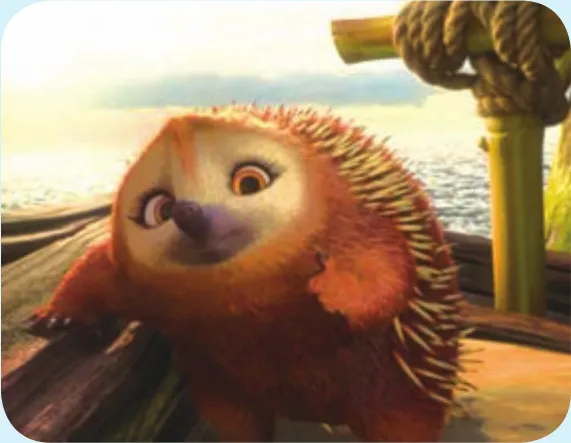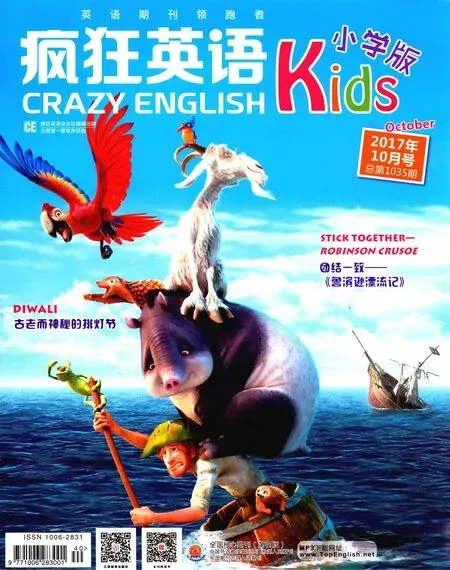团结一致《鲁滨逊漂流记》
Screen影视部落
团结一致《鲁滨逊漂流记》
Stick Together —Robinson Crusoe
本篇适合:模仿、角色扮演
电影《鲁滨逊漂流记》(Robinson Crusoe)改编自英国作家丹尼尔·笛福的同名小说。
一场暴风雨将鲁滨逊(Robinson Crusoe)和他的狗安斯利(Aynsley)带到了一座由小动物们主宰的荒岛上。在这座岛上,有擅长学舌又敢于冒险的鹦鹉马克(Mac)、老花眼又贪吃的山羊阿毛(Scrubs)、爱吃菠萝的可爱刺猬呆皮(Epi)、身手矫捷的变色龙卡梅罗(Carmello)、呆萌的穿山甲胖哥(Pango)、妩媚的翠鸟琪琪(Kiki)和憨态可掬的獏罗喜(Rosie)。在鲁滨逊到来之前,它们一直过着宁静的生活,只有马克渴望探索新世界。马克认定鲁滨逊就是他通往新世界的大门,并欣然接受了鲁滨逊给予他的新名字:星期二(Tuesday)。然而,随着鲁滨逊一起漂流到这个荒岛上的,还有潜在的敌人——恶猫霉霉(May)和马尔(Mal),恶猫军团的入侵对小岛造成了巨大威胁。一开始,语言的障碍使得岛上的动物们和鲁滨逊的初次见面并不愉快,马克的小伙伴们也受到恶猫的影响对鲁滨逊产生误解,但在马克的帮助下双方解除了误会,他们还一起在树上建了一所房子。他们团结一致,携手保卫新家园,最终赶走了恶猫。
by MQ

马克在摆脱一对恶猫的追捕时翅膀受了伤,并被鲁滨逊和安斯利救走了。但是马克的朋友们不明真相,认为马克惨遭“海怪”即鲁滨逊和安斯利的毒手。此时,还未走远的恶猫霉霉和马尔想要利用马克的朋友们把鲁滨逊和安斯利赶走。
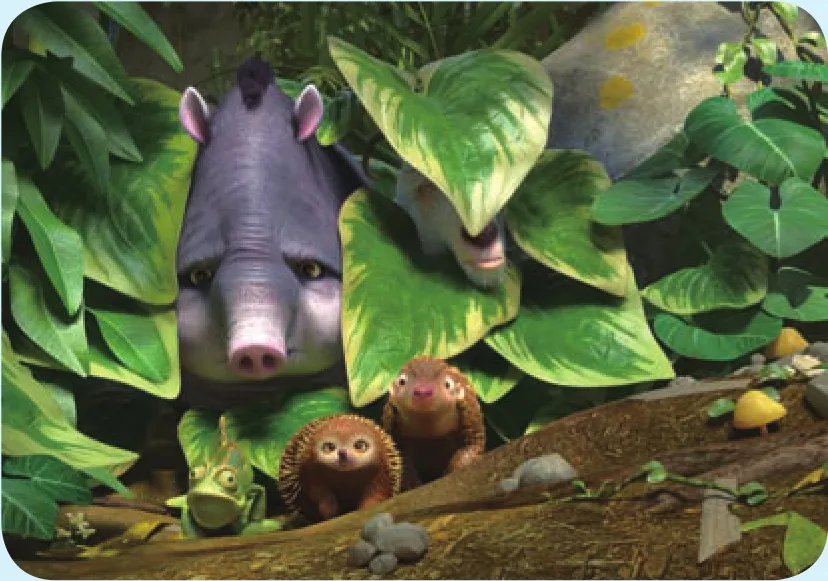
SCENE A
08
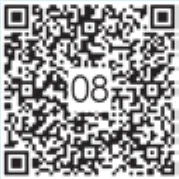
Scrubs:They’re nothing butcannibals!
Epi: Murderers.
May: Isay werunthemoffour island,drivethemonsters backinto the sea!Carmello: Perhapsaplanmight be toforcethem to live onCurse Island.
Mal:Yeah, oh, yes, yes… Curse Island. Er… whatexactlymeans Curse Island?
Pango:The end of the earth,mate, no one’severmade it back from there.
Epi:Yeah, there was nothing there butbugs.
Scrubs:Lots andlots of nastybugs!
May:Soundsperfect.Drive them to Curse Island.
Kiki:That’s not gonna work.
May:You have a better idea?
Kiki:Er, no.
May:Right, so then where were we?
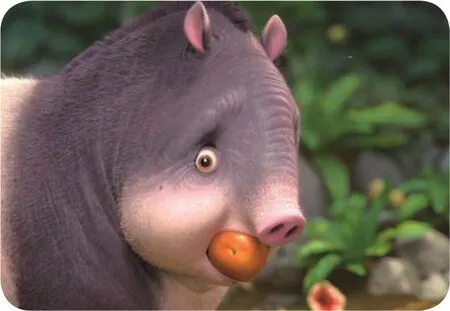
中文大意请见第45页。
Word Power
stick together[stɪk tə'geðə] 团结一致
cannibal['kænɪbl] n. 食人族,同类相食的动物(复数:cannibals)
murderer['mːdərə(r)] n. 杀人犯,凶手(复数:murderers)
run off[rʌn ɒf] 驱逐,迫使离开
drive back[draɪv bæk] 迫使后退,逐退
monster['mɒnstə(r)] n. 怪物(复数:monsters)
perhaps[pə'hæps] adv. 或许,也许
plan[plæn] n. 计划
force[fɔːs] v. 强迫
curse[kːs] n. 诅咒
island['aɪlənd] n. 岛,岛屿
exactly[ɪg'zæktlɪ] adv. 究竟,到底
mate[meɪt] n. 伙计,老兄
ever['evə(r)] adv. 曾经,这以前
bug[bʌg] n. 虫子(复数:bugs)
lots of[lɒts ɒv] 许多
nasty['nɑːstɪ] adj. 令人讨厌的
perfect['pːfɪkt] adj. 完美的,极好的
恶猫们被赶到了诅咒岛上,但在与恶猫战斗的过程中,安斯利为让马克脱险而牺牲了。于是马克决定留在鲁滨逊身边以帮助他在岛上的生活,而马克的朋友们也发现他们被恶猫利用了。
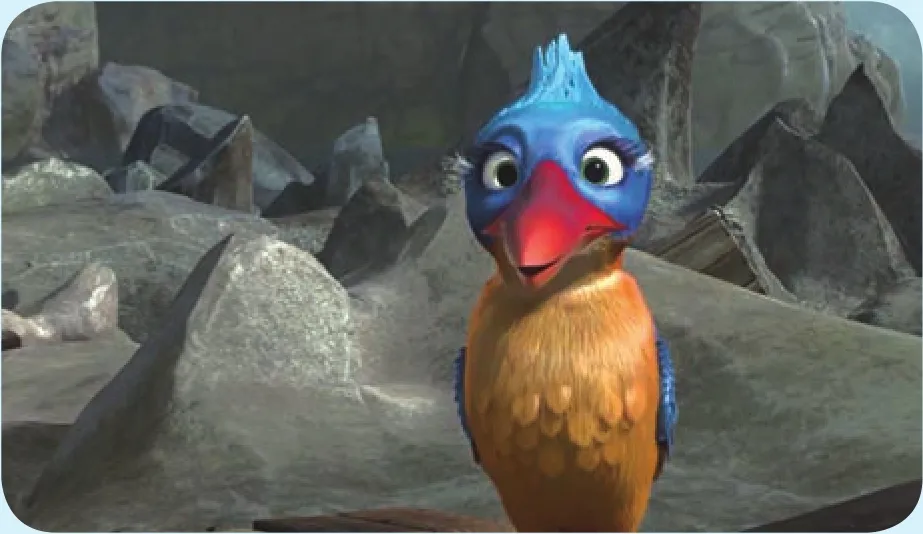
09
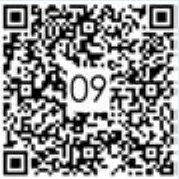
Kiki:Psst… Mac!
Mac:Kiki!
Kiki:Mac, you’re hurt!
Mac:I’ll be ok. I’m sure glad to see you. I was worried.
Kiki:Me too. Come on, now is your chance to get away.
Mac:I can’t.
Kiki:Let me help you.
Mac:No, no, I, I just, I don’t, want to get away.
Kiki:What?
Mac:You don’t understand. It’s all those cats’ fault.
Kiki:What do you mean?
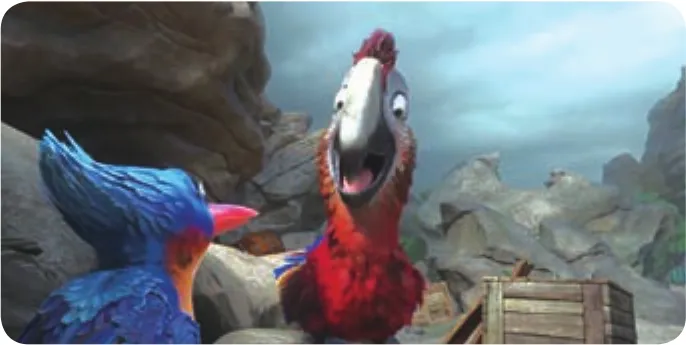

Mac:Theyattackedme. Hefi xedmywing.And his dog gave his life to save me. I can’t leave them now.
Kiki:Oh, I see. So, he’s going totake care ofyou?
Mac:Look, he’s gonna need my help tosurvive. Iowehim that.
Kiki:Exactly, how do you plan on doing that?I mean, look at him.
Crusoe:Ah! Tuesday! Help!

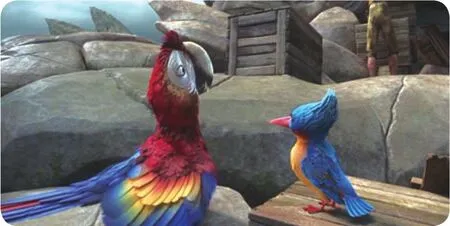
Rosie:I don’t believe it, those cats used us, and Macas well, and what do we do? We attacked the human.Scrubs:Hold on,then. So, what you’re saying is Kiki’s to blame forall this?
Pango: Afraidso.
Kiki:That’s notfair. We all thought Mac was dead,didn’t we?
Pango:Oh, this is not good, mate.
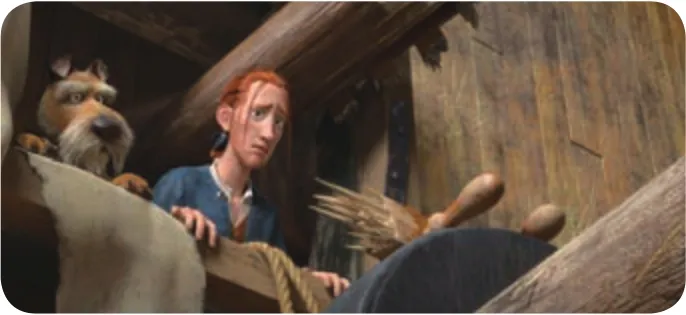
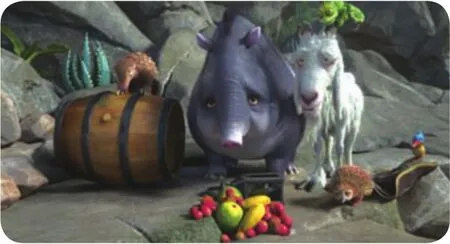
Epi:Yeah, we’ve made a realmessof things.
Pango:Looks that way, Epi gal.
Scrubs:Where are you going, Rosie?
Rosie:Off to clean about mess.
Epi:I’m in!
Pango:Let’sget crackingthen, mate.
Kiki:Wait a second. Ah, you’re going to make an even bigger mess of things.
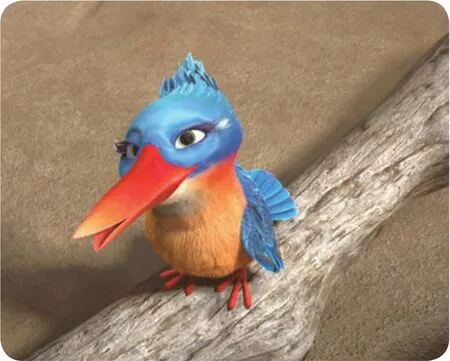
中文大意请见第45页。
Word Power
worried['wʌrɪd] adj. 担心的
get away[get ə'weɪ] 逃跑
fault[fɔːlt] n. 过错,责任
attack['ətæk] v. 攻击(过去式:attacked)f
i x[fɪks] v. 修理,治愈(过去式: fi xed)
wing[wɪŋ] n. 翅膀
take care of[teɪk keə ɒv] 照顾
survive[sə'vaɪv] v. 生存
owe[əʊ] v. 欠(债)
as well[æz wel] 也,还有
hold on[həʊld ɒn] 等一等
be to blame for[biː tuː bleɪm fɔː] 对……应负责任
afraid[ə'freɪd] adj. 恐怕
fair[feə(r)] adj. 公平的,合理的
mess[mes] n. 混乱,烂摊子
gal[gæl] n. 女孩,姑娘
get cracking[get 'krækɪŋ] (迅速)开始工作
鲁滨逊想要建一个树屋,但他发现仅凭一己之力似乎很难办到。明白了鲁滨逊的想法后,马克和他的朋友们决定一起竭尽所能帮助鲁滨逊。
SCENE C

10

Mac:For all hispoundingandsawing, we couldn’tfi gureout what he wasactuallydoing.
Crusoe:Oh! Now what is going on? Really?
Mac:I couldn’t blame Rosie. When you’ve got anitch, you’ve gottascratchit. But poor Crusoe, he didn’t see it that way, he had had enough. And that’s when ithitme—a nest.Hey, guys. I’ve fi gured out what he was doing.
Kiki:Er… making a mess?
Mac:No, he’s building ashelter.
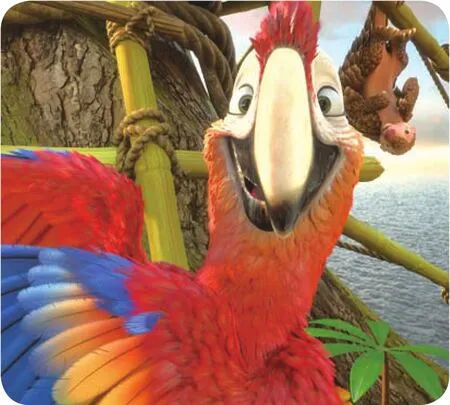
Pango:I don’tfollowyou, mate.
Mac:He’s building a nest.
Kiki:A nest?
Scrubs:So he is a bird.
Mac:Scrubs, he’s building a human nest in the tree.
Kiki:Oh,prettyclever.
Rosie:I’ve never slept in a tree.
Epi:If hestocksit with food, you’ll sleep in a tree.
Scrubs:Good point. So guys, I got an idea. What do you say we help him out? Get this nest of his built.
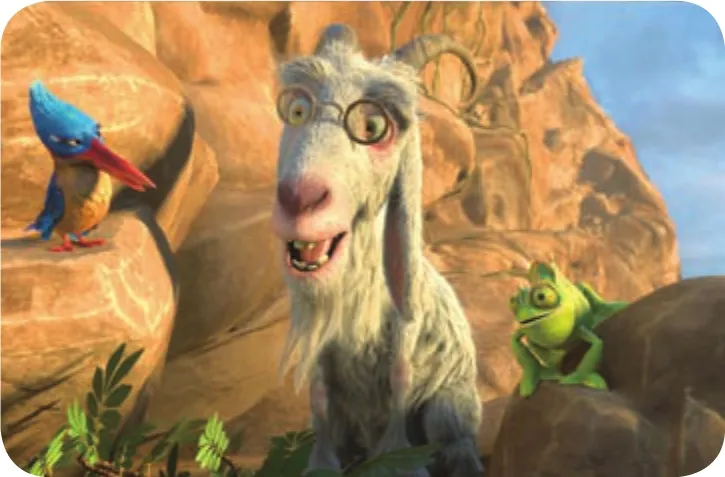
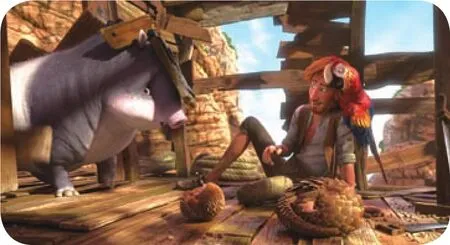
Mac:We didn’t really have any idea what we weregetting into.We just figured,let’s help, usewhatever abilitieswe had, and hoped it all worked.
Crusoe:Well, I’ll begobsmacked.
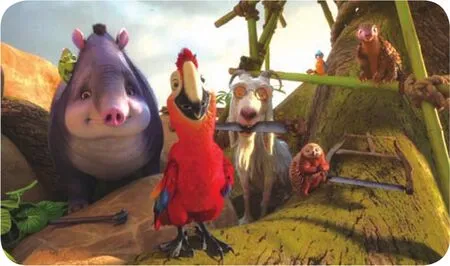
中文大意请见第46页。
Word Power
pounding['paʊndɪŋ] n. 重击
sawing['sɔːɪŋ] n. 锯切
fi gure['fɪgə(r)] v. 猜想
actually['æktʃʊəlɪ] adv. 实际上,事实上
itch[ɪtʃ] n. 痒
scratch[skrætʃ] v. 搔(痒)
hit[hɪt] v.(突然)想到
shelter['ʃeltə] n. 居所
follow['fɒləʊ] v. 明白,理解
pretty['prɪtɪ] adv. 相当,颇
stock[stɒk] v. 贮存(第三人称单数:stocks)
get into[get 'ɪntuː] 从事,致力于(-ing形式:getting into)
whatever[wɒt'evə] pron. 无论什么
ability[ə'bɪlətɪ] n. 能力(复数:abilities)
gobsmacked['gɒbsmækt] adj. 大吃一惊的
Let's Learn
1) So then where were we? 刚才我们说到哪儿了?where were we除了有“我们在哪里”的意思外,还可以用来表示“我们说到哪儿了”,常用于口语中。例如:Where were we on Friday afternoon? 周五下午我们在哪儿?Sorry for the interruption. Where were we? 抱歉,刚才被打断了。我们说到哪儿了?
2) We’ve made a real mess of things. 我们闯了大祸。make a mess 的意思是“制造混乱”“搞成一团糟”。例如:She makes a mess in the kitchen. 她把厨房搞得一团糟。
3) Get this nest of his built. 把他的这个鸟窝做好。get sth. done(过去分词形式) 表示“使某事被做好”。例如:I want to get my hair cut. 我想理发。
